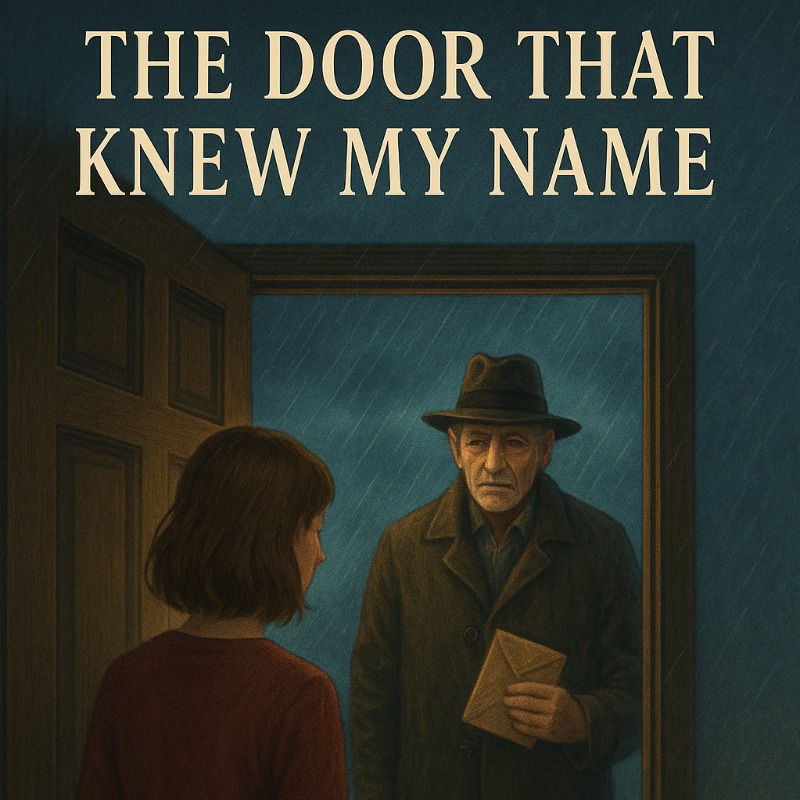It was a quiet Tuesday. The kind where silence hums louder than noise. The rain tapped gently against my window like a memory trying to get in. The world outside blurred into a watercolor painting—gray, calm, and unbothered.
Inside, I was nursing the ache of another dream that hadn’t survived the morning. My coffee had gone cold. My laptop screen glowed blank. Deadlines, bills, unopened messages—they all circled me like vultures, waiting.
That’s when I heard it.
Three knocks.
Firm. Deliberate. Not rushed. Not hesitant. Like a metronome, marking the moment my life split into before and after.
I hesitated. It wasn’t fear exactly. More like that eerie stillness when you realize you’re not alone—though no one else is supposed to be there.
I opened the door.
He stood there, cloaked in an old, tattered coat soaked from the rain. His hair was silver, not white. His face—lined like a roadmap through time—seemed oddly familiar. But it was his eyes that caught me: aged, yet clear, as if they had seen my entire life unfold.
"May I come in?" he asked. His voice was rough around the edges, like something ancient and fragile.
I blinked. "Do I know you?"
He smiled gently. "Not yet. But you will."
Something about his tone was… unshakeable. He wasn’t threatening. He wasn’t pleading. He was certain.
I stepped aside.
He walked in, his boots leaving muddy prints on the floor. I should have been annoyed. I should have asked for ID, demanded an explanation, anything. But instead, I followed him like a shadow.
He didn’t sit. He paced slowly, as if absorbing the walls, the ceiling, the photos I hadn’t dusted in weeks. He touched nothing, but looked at everything.
Then he spoke.
"Your mother used to hum while painting in that corner. The kitchen always smelled like lemon when she was happy. And you... you never liked goodbyes."
I froze. My lips parted. My heartbeat stuttered.
"Who are you?"
He turned to me with those knowing eyes. "I’m someone from the life you forgot to live."
He reached into his coat and pulled out a letter. The paper was wrinkled, the ink faded. My name was on the front, written in a script that stopped existing when I was thirteen.
My mother’s handwriting.
"She never got to give it to you," he said.
My hands trembled as I took it. I opened it, and the words fell like autumn leaves—quiet, inevitable, and full of color.
She wrote about how proud she was. How sorry she was for the fights, the silence, the rushed mornings. How she believed in the stories I used to tell my stuffed animals. How she wished I’d never stop.
I cried. No, I crumbled.
And as I stood there, something shifted.
I remembered my mother’s laugh—how it bubbled up unexpectedly, especially when I told her I wanted to build a spaceship from shoeboxes. I remembered the scent of cinnamon from her favorite tea and how we used to watch the rain together, tracing drops down the glass like racing comets.
But more than anything, I remembered the door. The door she once stood behind, holding a tray of cookies and saying, “No matter what happens out there, this will always be your home.”
I don’t remember how long I stood there, sobbing with the letter pressed to my chest. But when I looked up—
He was gone.
No footsteps. No closing door. No trace.
Only the letter. And the muddy footprints that ended a few inches inside my home.
For days after, I questioned my sanity. Was he a ghost? A trick of grief? A man sent by someone trying to be kind? But none of it made sense. No one else knew those memories. No one else could’ve written that letter but her.
I never found him again. The police had no answers. There were no cameras on my street. But something changed that day.
I wrote again.
I lived again.
I forgave again.
Two years later
I’ve written two books since that evening. Both explored loss, love, and the invisible threads that tie souls together. Readers wrote in—strangers—telling me how my words healed parts of them. I wanted to reply, to explain that I hadn’t written those stories alone.
Last winter, while speaking at a literature festival, a young woman approached me. Her eyes glistened with unshed tears. “Your words brought back my brother,” she said. “He passed away two years ago, but through your story, I remembered how he used to sneak into my room and leave sticky notes with silly poems.”
I smiled. And I knew.
He was still knocking on doors. Not just mine.
Sometimes, late at night, I sit by the window, cup of warm tea in hand. The rain has become a friend now, not a ghost. And every time I hear a knock—on wood, in dreams, in my heart—I open the door.
Because the next stranger might be someone I once loved.
Or someone I might one day become.
A stranger once came to my door.
And he left behind the version of me I had buried long ago.



 React
React
 React
React
 React
React
 React
React
 React
React